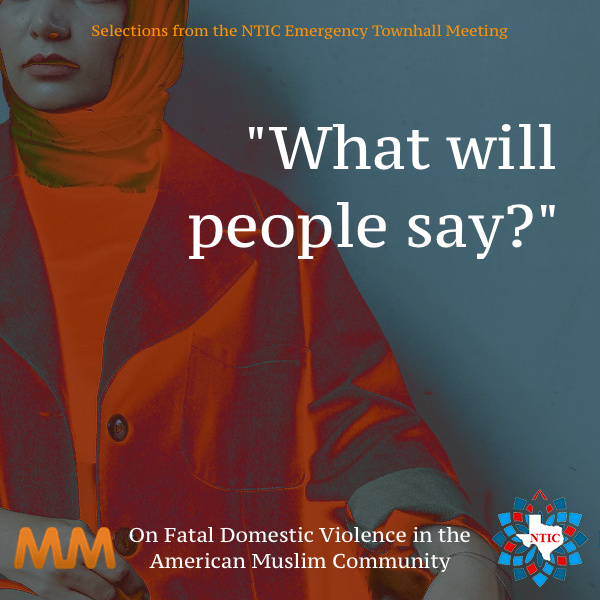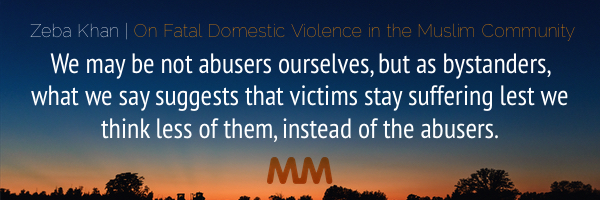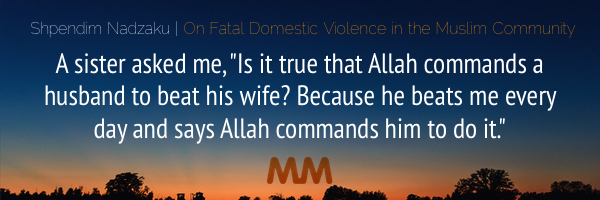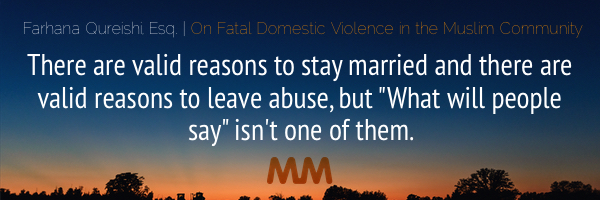Domestic Violence Series
“What will people say?” [Part 4] On Fatal Domestic Violence in The Muslim Community

Published

Zeba Khan, MuslimMatters
As a media professional, I am immersed in what the people say. I’m online, I’m on social media, I manage comments sections, and what we see in the big picture is that some of the factors that keep women from getting help and from leaving abusive marriages are what the people are saying.
What will her parents say? What do her friends say? What will the Imam say? Do the people say ‘Oh that’s not abuse’ or ‘You should be grateful’ or, ‘’He said sorry, so why are you being so selfish?’
‘Why do you have to leave?’
Keep supporting MuslimMatters for the sake of Allah
Alhamdulillah, we're at over 850 supporters. Help us get to 900 supporters this month. All it takes is a small gift from a reader like you to keep us going, for just $2 / month.
The Prophet (SAW) has taught us the best of deeds are those that done consistently, even if they are small. Click here to support MuslimMatters with a monthly donation of $2 per month. Set it and collect blessings from Allah (swt) for the khayr you're supporting without thinking about it.
‘Can’t you think of the children?’
A litany of questions get posed to victims that prevent them from seeking help, from even seeing the situation as abuse, and from being able to access professionals in our community who could benefit them. They are overwhelmingly directed against those suffering from abuse, instead of questioning those who perpetuate it.
This is important, because the things we say to each other become the narrative of our community, regardless of whether they deserve to be or not. Instead of shaming abusers, we shame those seeking to escape them. Instead of asking abusers to answer for their actions, we ask their victims what they did to deserve it. We pretend that all marriages are a dream and every divorce is a nightmare. Through what the people say about women seeking divorce, we make it seem haram when Allah made it halal.
When we make divorce seem worse than death, then we make abuse seem better than the shame and isolation that divorced women can face in their own communities, and even from their own families. Some people would rather die than get divorced, and others would rather kill instead.
In May of this year, Sadia Manzoor was shot and killed by the husband against whom she had reported domestic violence. They were living apart when he showed up and shot Sadia, her mother, their four year old daughter, and then himself.
In July of this year, a Muslim man drove 11 hours to his ex-wife’s home where he first shot her in the head, and then himself. Sania Khan was only 29 years old.
Less than 20 hours later, Alwiya Mohamed was shot and killed by her husband, who then turned the gun on himself. Their one-year-old son was home at the time.
We have to change the way that we talk about marriage, abuse, and divorce in our communities because regardless of what role we play, we are all a part of “what people say.”
We may not be the abusers themselves, but as bystanders, are we still going to tell victims to stay beaten, humiliated, and killed so that we don’t think less of them? Can we really allow Muslim women to be beaten and killed while we look the other way, or ask what she did to deserve it?
On the Day of Judgment, when Allah gathers all of humanity to account for all its good and all of its evil, what excuse can we give for turning a blind eye to abuse? Can we say to Allah, “But I’m not the one who pulled the trigger,” when Allah asks why we looked the other way? Why – even when we knew she was being beaten and threatened – we chose to protect the honor of her abuser instead?
The answer is no. If your heart bleeds for Muslim women and Muslim children murdered by non-Muslims, then it should bleed twice for the Muslims murdered by other Muslims. Compelling women to stay in abusive, dangerous marriages doesn’t “preserve the marriage,” it destroys the entire community instead.
Imam Shpendim Nadzaku , Resident Scholar – Islamic Association of North Texas
For too many of us, our culture is really our religion. We think we understand Islam, we think so MashaAllah, but really we have convoluted it. Sometimes when a sister, or whoever that comes forward, is seeking to talk about abuse, there is this concern. There is this burden they carry as if they’re committing a major sin by meeting, by talking about abuse, and that should never be the case.
“And if you sense ill-conduct from your women, advise them ˹first˺, ˹if they persist,˺ do not share their beds, ˹but if they still persist,˺ then discipline them ˹gently˺.2 But if they change their ways, do not be unjust to them. Surely Allah is Most High, All-Great.”
There is an ayah (verse) in Surah Al Nisaa that has unfortunately become infamous – that Walllahi Azza wa Jall – should never have become infamous. That is due to the abuse and misunderstanding about the steps in which conflict within marriages take place. The first step is that there should be this aspect of dialogue and speaking, and a resolution through communication. If that doesn’t work, the second step is to let there be something on the emotional side. Don’t sleep together in the same bed and let that be a sign to show that this is really serious now. And then, only after the first two steps, comes – وَٱضْرِبُوهُنَّ ۖ,
To Change With the Hand – Implementing Services for Domestic Abuse Survivors in Muslim Communities
I had a person, a sister, call the masjid asking, “Is it true Allah in the Quran commands the husband to beat his wife? Because my husband beats me every single day and says Allah commands him to.”
I don’t know if we read the Quran or not but SubhanAllah, among the things that Allah SWT asks is “وَمَنْ أَظْلَمُ مِمَّنِ ٱفْتَرَىٰ عَلَى ٱللَّهِ كَذِبًا ۚ” Who is worse than the person that attributes lies to Allah?
I addressed this issue in the masjid that same night. I addressed my jama’a (congregation) and literally, I heard a person, I could not tell who it was, who yelled saying, “Why do we have to talk about this in the masjid? Why do we have to bring these things up?”
Part of that cultural abuse is that we have issues that people want to sweep everything under the rug and make sure that whatever we’re doing of haram (forbidden) nobody knows. The impact of that is how it’s breaking up families, how it’s exacerbating mental illness, and how it’s causing our youth and our children to walk away from Allah. Because they assume that, “Oh, my parents MashaAllah, my family, they are Muslims so this has to be Islam.
It’s hard to say this, but in the same way I talk to non-Muslims, I tell those youth that we need to disassociate Islam from Muslims. Wallahi as Muslims we have to be on the same level. Islam is one thing, Muslims all too often are another.
And so, when we’re talking about this issue, it is a very difficult one. And as Muslims, we want to avoid things that are uncomfortable and things that are difficult. However at the core of it, the causes of abuse mean we have to look at ourselves and to change. All too often, we think that we are just fine the way that we are.
Honestly, we need to understand that the preventive perspective in Islam is golden, and so, premarital attention is where I think we really want to focus. All too often, we are caught up on the wedding – the Masha Allah of these physical things. But the substance of what the marriage is supposed to be, that is going to take the person and carry them through InshaAllah until the angel that death comes to take their soul, very little attention is given to that.
I wish that as Masajid, that we could establish a policy that says nobody gets married until they have successfully gone through some form of premarital counseling, and then those counselors communicate with us and say, “Yes, they have truly completed it.”
If someone says, “Why do we have to get feedback from them? Following such things is foolish.” I reply that we really need to have something to show that people are mature, that they have that depth of character and of understanding, Insha Allah, so that they will have a better chance of having what Allah meant marriage to be; A source of tranquility because of the two ingredients, love and of kindness.
.
Farhana Qureshi Esq.
Managing Partner & Family Law Attorney
Qureshi & Salejee PLLC
I deal with women who come in searching for a divorce, searching for answers, or searching for a solution to their situation. Because of what people will say, many times they don’t have the right information on what happens in a divorce, or what happens if they’re seeking to separate from an abusive person. Their spouse will tell them, “Well, you’re never going to see our kids again. If you decide to divorce me, I’m going to take away your kids.” But that’s not true.
According to the law, both parents have rights to their children, and in the case of abuse, it’s the abuser actually who doesn’t have the rights. So, it’s important for women – because most of the time it is a woman – to understand that she will have rights to her children.
The other thing I deal with is the financial aspect. Women don’t want to leave abusive relationships because they don’t earn a living. People say, how will they take care of themselves and the children? So there is – according to law – spousal support. There is child support. That may not cover everything, but you’re not just going to be left on your own. Women don’t have information regarding the legal system that could otherwise ease that process, if they just knew. Many women are afraid of taking that step because of the lack of information.
There are so many reasons to stay in a marriage, and so many obstacles to getting out of an abusive marriage, but “What will people say?” should not be one of them. Because people will not be there when you’re being abused, when you’re being hit, or when you’re called names. People are not there when your children witness these things.
I have women that come to me later in their lives, in their 50s or 60s who say, “I wish I had done this earlier. I wish my kids didn’t have to live through this trauma which they now carry to their children.”
Asking “What will people say” puts the opinion of people over the opinion of Allah. As Muslims, are we more afraid of what people will say – even when those people do not have the power to benefit or harm us in any way? Or, are we more afraid of what Allah says?
The people are not going to help you, Allah is going to help you. Allah says do not be oppress and do not be oppressed. Let’s worship Allah and not worship the people, and let us make the right decisions so we don’t perpetuate the cycle of violence. Our kids are witnessing it.
Keep supporting MuslimMatters for the sake of Allah
Alhamdulillah, we're at over 850 supporters. Help us get to 900 supporters this month. All it takes is a small gift from a reader like you to keep us going, for just $2 / month.
The Prophet (SAW) has taught us the best of deeds are those that done consistently, even if they are small. Click here to support MuslimMatters with a monthly donation of $2 per month. Set it and collect blessings from Allah (swt) for the khayr you're supporting without thinking about it.
Zeba Khan is the Editor at Large - Special Needs for MuslimMatters.org, as well as a writer, speaker, and advocate for social justice. In addition to having a child with autism, she herself lives with Ehlers-Danlos Sydrome, Dysautonomia, Mast-Cell Activation Disorder, and a random assortment of acronyms that collectively translate to chronic illness and progressive disability. She is also an enthusiastic student of martial arts.


Faith, Identity, And Resistance Among Black Muslim Students

Moonshot [Part 12] – November Evans

From The Prophets To Karbala: The Timeless Lessons Of Ashura For Muslims Today

Moonshot [Part 11] – The Fig Factory

Nationalism And Its Kurdish Discontents [Part II of II]: Kurds And Turkiye After Ottoman Rule

Moonshot [Part 11] – The Fig Factory

Moonshot [Part 12] – November Evans

Moonshot [Part 10] – The Marco Polo

Moonshot [Part 9] – A Religion For Real Life

Nationalism And Its Kurdish Discontents [Part II of II]: Kurds And Turkiye After Ottoman Rule

[Dhul Hijjah Series] Calling Upon the Divine: The Art of Du’a (Part 1)

IOK Ramadan 2025: Four Steps | Sh Zaid Khan

IOK Ramadan 2025: Do Your Best | Sh Zaid Khan

IOK Ramadan 2025: Giving Preference to Others | Sh Zaid Khan






